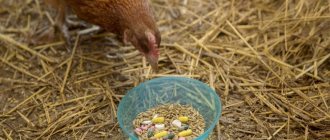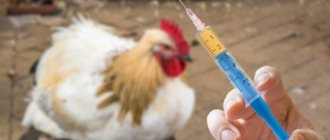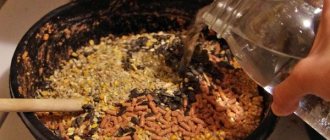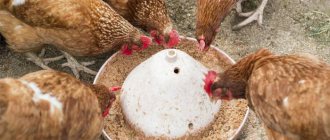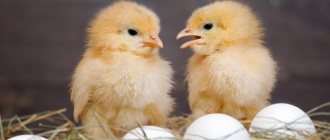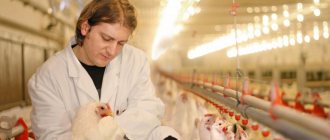A chicken egg contains many useful microelements and vitamins, the shell is no exception. But sometimes hens have problems that affect the appearance of the eggs. Thin shells on chicken eggs are a common and common phenomenon. Therefore, when you see something like this, you should not immediately panic; there are quite a few reasons for this and they are not always associated with some kind of disease. Experienced farmers first of all pay attention to the behavior of chickens, their diet and living conditions, initially correcting these factors. And if the problem does not go away, contact the veterinarian. Below are the main causes of thin shells and the measures that need to be taken to eliminate them.
Chemical composition of the shell
The main constituent element of the shell is Calcium, or rather its compound calcium carbonate. Its peculiarity is that thanks to the synthesis of the transformation that the shell went through when leaving the bird, calcium is 100% absorbed by the human body. The compound occupies 90% of the total share in the chemical composition, the remaining 10% is distributed among the following elements:
- copper;
- fluorine;
- molybdenum;
- phosphorus;
- sulfur;
- silicon.
The shell also contains trace elements such as selenium and zinc. In total, scientists have counted over 27 units of useful components.
Calcium carbonate in the human body forms stable compounds with phosphorus, in the form of calcium phosphates. This has a beneficial effect on the formation of the skeletal system and teeth.
The uniqueness of the shell is that when an egg is formed, calcium ions are easily attracted, forming a strong frame, so when they enter the human body, they are just as easily separated and distributed at the cellular level.
Causes
There are many factors influencing the condition of the shell, including parameters that differ from the genetics of different breeds of chickens, their mobility, age, and other things. But the main factors still stand out:
- poultry nutrition;
- hormonal disorder;
- infectious diseases.
The egg shell is formed under the influence of three important bioactive microelements: nitrogen, calcium and phosphorus. But the lack of others also affects defects, although to a lesser extent. Don't forget to add foods rich in zinc, iodine and manganese to your diet. Find out why chickens don't lay eggs at this link.
Bad diet
Domestic breed chickens on farms lay eggs all year round, so the diet should always be balanced and rich in vitamins. If these conditions are not met, a problem arises in the absence of the shell or its thinning.
The correct egg is oval in shape, hard, smooth in feel with a slight roughness.
The membrane becomes thinner if there is an acute lack of vitamins. For example, feed is not balanced and does not include the required amount of calcium, phosphorus, zinc, vitamin D and C.
- Calcium is the primary source and basis of the shell.
- Phosphorus provides a stable connection and hardness of the shell.
- D and C improve the connection of calcium ions with each other.
Since laying hens only absorb half of the vitamins they consume, it should be remembered that to form one egg, a chicken needs to eat at least 4.4 g of calcium. Otherwise, the deficiency will be replenished from the bones of the bird, which leads to its diseases. The ratio of calcium to phosphorus is considered 4:1, respectively. But you shouldn’t overeat foods rich in calcium either, since then the membrane will become too thick and rough.
Hormonal disorders
Oddly enough, hormonal disorders in chickens also affect the egg shell. The main reason is not the failure of the endocrine system, but its effect on the nerve endings. For example, when two eggs mature at the same time, the body does not have time to recover and the second egg comes out with a thin shell.
Often young laying hens with unsettled reproductive capacity may produce soft eggs. In all cases, there is no point in worrying; it is important to observe the birds for 1.5-2 weeks, their behavior, nutrition and exercise. It is possible that the problem will go away on its own.
If the process does not return to normal, then the chicken is shown to the veterinarian.
Prevention measures
A thin shell is not considered a serious pathology, but such a phenomenon cannot be called the norm, so it is worth making every effort to strengthen the eggs. In this case, preventive measures involve performing several simple actions (not counting a well-balanced diet):
- Several months before laying, begin adding nutrients (especially calcium) to your bird's food.
- To produce a sufficient amount of vitamin D in the body of birds, do not forget to provide them with a spacious walk in a well-lit area, where in the summer the hens can spend most of their day.
- Take care of the prevention of infectious bronchitis and other diseases typical of poultry in farms with poor housing conditions (timely vaccination will help achieve maximum results).
- Do not force early laying from young laying hens.
- Adhere to a certain regime in the distribution of feed and the daily routine of poultry.
- Change the bedding in the chicken coop in a timely manner: it should always be fresh and of high quality.
Simply put, the owner of the birds is only required to comply with the general rules for keeping and feeding chickens, and then the likelihood of the appearance of “wrong” eggs with thin shells will be minimal. You shouldn’t focus too much attention on this, but if a problem arises, you should still try to solve it in the simplest and most accessible ways: by normalizing your diet and daily routine.
Diseases
Infections, including viral ones, have a negative impact on egg formation. Most often, birds on small farms are susceptible to them, since poultry farms vaccinate all animals and have a veterinarian on staff who regularly examines laying hens.
Infectious bronchitis
Infectious bronchitis affects the bird's lungs and can be transmitted to other laying hens. In this regard, there is a general weakening of the body and the quantity and quality of eggs laid decreases.
Signs of it can be seen by the chicken’s constant coughing and decreased appetite.
This article will tell you how to treat chickens that sneeze and wheeze.
Newcastle disease
This is a systemic disease. Symptoms of Newcastle disease are visible to the naked eye. In addition to lethargy, lack of appetite; Inflammatory processes appear in the eye area, suppuration, nasal discharge, and diarrhea.
The productivity of laying hens is reduced by up to 50%; the eggs themselves can be either with a very thin, almost transparent shell, or without it at all (cast eggs or syndrome-76). As a rule, such eggs are unsuitable for food.
The spread of infection is rapid, so at the first sign a sick individual is removed from the chicken coop.
Bird flu
Many farmers know bird flu firsthand. An acute infection affects all organs: breathing, esophagus and spreads among chickens very quickly, leading to death. Eggs of infected laying hens are contraindicated for consumption. This disease affects the quality of the shell - it becomes soft. The influenza virus type “A” itself does not survive at high temperatures, so you can eat the meat of sick chicken with an hour-long heat treatment. But if the H5N1 strain is diagnosed, then such laying hens are disposed of and a local quarantine is declared.
Mycoplasmosis
Mycoplasmosis is an infection that penetrates the oviduct and causes inflammatory processes there. According to the qualitative characteristics of egg production, the disease manifests itself as follows:
- reduction in masonry by 4-15%;
- the number of unfertilized eggs is more than 30%;
- dead embryos - 10-25% of the total number of eggs.
In addition to the reduction in laying, chickens experience swelling of the cornea and its redness.
If a chicken is diagnosed with mycoplasmosis, then, as a rule, these eggs are not used for further incubation.
Reduced egg production syndrome
Reduced egg production syndrome is more likely a genetic disease. If it is detected, you should immediately show it to a veterinarian, do the necessary tests, and if the problem is genetic, then remove the laying hens from circulation. Sometimes the disease can be caused by stress, then the doctor prescribes a set of measures to restore the individual.
Causes of small eggs in laying hens
Small-caliber eggs are the result of certain pathologies, age-related changes and the breed of the bird.
It happens that defective eggs fall on your head like a snowball, that is, they appear suddenly. Any schoolchild knows that a chicken egg is a very nutritious food. It contains biologically complete proteins, healthy fats, carbohydrates and minerals.
The percentage of digestibility of nutrients of an essential product in natural containers (shells) ranges from 97-98%. A 50 gram egg is equivalent to 40 grams of meat food.
If small eggs appear rarely, you don’t have to bother with them. The alarm should be sounded if the problem is persistent.
Underweight eggs are explained:
- First egg laying;
- breed characteristics;
- hormonal imbalance;
- influence of stress factors;
- inflammatory process.
Chickens with damage to the oviduct also lay small eggs.
Important! Laying hens suffer from poor egg production when kept in conditions that are inconsistent with their physiology. We are talking about the wrong microclimate
How to treat
Depending on the reason that contributed to the appearance of a thin shell, the bird is treated. Also, it should be remembered that when infectious diseases are detected, the laying hens are eliminated from the rest and they seek help from veterinarians.
From diseases
When bronchitis or Newcastle disease is detected, special sprays are most often sprayed at the initial stage to disinfect the air and disinfect the chicken coop, and the sick individual is immediately separated from others. Bedding is also processed, hay is replaced, and clean water and feed are regularly supplied. Read about bedding with bacteria for chicken coops here.
Each specific disease requires a specific treatment regimen, which is prescribed only by a veterinarian based on tests and visual observations.
Nutrition
For a balanced diet, it is important to include carrots, cabbage, and greens in your diet. Wheat bran and vegetable oil are very useful. They are rich in manganese and phosphorus.
Wheat is a natural and powerful biostimulant, so grains are included in the daily diet of poultry. Read how to germinate wheat for laying hens here.
Most often, chickens that eat leftovers from the master's table suffer from a lack of vitamins. Such an incorrect diet leads to thinning of the shell.
Shell rock and pebbles are a direct source of calcium, so try to add them in crushed form to each feeding.
Chicken's nitrogen comes from salt. But it should be understood that increasing the permissible dose of 3.4 g leads to the death of the bird.
Vitamin therapy
Balanced food contains all the necessary vitamins, but if it is not possible to buy them, then narrowly targeted components are added to the food.
- Limestone, chalk, ash and shell rock are sources of calcium. This element is also sold in liquid form, but since it is bitter, birds often refuse to eat food containing it.
- Bone meal and phosphates are an ideal source of not only calcium, but also phosphorus.
- Fish oil meets vitamin D needs.
This material will tell you why chickens peck eggs.
Chicken processes only half of the vitamins given, so it is necessary to add 2 times more to the diet.
Improving conditions of detention
Changing housing conditions is a budget-friendly and sometimes the most effective solution to the problem of egg laying. In order for laying hens to strengthen their immune system and receive a large amount of vitamin D, they are provided with regular grazing in an open area on the sunny side. When kept in cages, enclosures are equipped with ultraviolet lamps. This improves the synthesis of substances and calcium is absorbed much better and faster.
Why do chickens lay eggs with thin shells?
In fact, there are plenty of reasons for softening the hard shell of chicken eggs, and the first “suspect” is an unbalanced diet. However, if everything is in order with the chickens’ menu, and you are sure that their body has sufficient vitamins and minerals, then you should think about possible hormonal imbalances or the development of diseases. By identifying the specific cause of the violations, it will be easier for you to deal with it.
Did you know? Sometimes two yolks can be found in one egg, which is considered a rather rare anomaly. In this regard, many folk signs have appeared: some promise good luck to the person who finds such an unusual egg (for women - the imminent birth of a child), while others promise grief in the family.
Bad diet
Important minerals such as:
- manganese;
- zinc;
- cobalt;
- copper;
- calcium;
- iodine;
- sodium;
- iron;
- phosphorus.
In order for all these elements to enter the body of laying hens in sufficient quantities, the birds' diet must be varied.
So, to replenish phosphorus reserves, it is useful to add bone meal to the mash (no more than 1 g per chicken per day), pour grain bran into the feeders, and give sunflower cake. A considerable amount of sodium is contained in table salt, so this product is useful when preparing wet mash (0.5 g per 1 chicken will be enough). Calcium is a significant part of the composition of shell rock and chalk, so in crushed form they can also be introduced into the diet of birds.
In the summer, laying hens usually do not experience a lack of nutrients, because they get almost everything they need from green feed and wheat.
In winter, feed mixtures can partially solve the problem of balanced nutrition, but this is only if they contain diverse ingredients: ground corn, wheat (at least 20%), barley, sunflower meal, meat and bone meal, fish or grass meal, yeast, peas, salt (no more than 3 g per day), vitamin complex.
Find out what to feed chickens in winter to help them lay eggs well.
Hormonal disorders
The entire process of formation of a chicken egg is controlled by the nervous system, and not without the participation of hormones. Thus, in a stressful state, the normal maturation of the egg is immediately disrupted, and this is one of the main reasons for the appearance of specimens without a shell. The entire process of egg formation is as follows:
- Eggs form and mature in the ovaries of a chicken.
- Then they enter the oviduct, and later into the genital tract.
- If there is a rooster, fertilization occurs, and if it is not there, then all the necessary membranes (white, yolk, shell) are simply formed.
Immediately after the first, the second egg matures, which will soon be ready to be released.
However, it also happens that several eggs appear in the oviduct at once, which is why an egg with two yolks or two separate eggs is formed, but the second one simply does not have enough upper covering material - the shell. Usually this phenomenon is not considered pathological, but if laying hens are kept in unsuitable living conditions and are constantly nervous, then their eggs will almost always be “problematic.” Violations can also occur if unsuitable feed or additives are used, especially those containing hormones.
conclusions
Thin shells are a common and solvable phenomenon in poultry farming. The main thing is to understand the reason that led to the thinning of the membrane.
- Poor, unbalanced diet, lack of vitamins, improper living conditions are the most popular root causes.
- Infectious and viral diseases also affect the composition of the shell, but they pose a danger not only to the bird itself, but to the entire chicken coop. It is important to identify and eliminate sick individuals from the livestock in a timely manner.
- If, when changing the quality of food and living conditions, no visible improvements in egg laying are observed, then you should definitely show the laying hen to a veterinarian.
